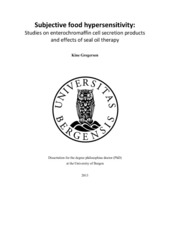| dc.contributor.author | Gregersen, Kine | en_US |
| dc.date.accessioned | 2013-06-23T13:55:51Z | |
| dc.date.available | 2013-06-23T13:55:51Z | |
| dc.date.issued | 2013-03-08 | eng |
| dc.identifier.isbn | 978-82-308-2249-4 | en_US |
| dc.identifier.uri | https://hdl.handle.net/1956/6720 | |
| dc.description.abstract | Background: Perceived food hypersensitivity is a prevalent condition which often remains medically unexplained. The etiology of this subjective condition is not fully understood, mainly because of a lack of specific diagnostic methods, together with limited knowledge about underlying pathogenetic mechanisms. Thus, the management of such patients is challenging. Aim: The objective of the present thesis was to assess the potential beneficial effects of seal oil on symptoms, and to develop a novel sample protocol to investigate the putative role of enteroendocrine secretorial compounds in patients with subjective food hypersensitivity. Results: In study I, a single dose of duodenal administered seal oil significantly influenced neither gastric accommodation, as examined by two dimensional (2D) ultrasonographic scanning, nor meal-induced gastrointestinal symptoms, as assessed by visual analogue scales (VAS). After 10 days’ treatment, duodenal administered seal oil, as compared to soy oil, significantly reduced meal-induced gastrointestinal symptoms. However, the symptomatic improvement was not associated with improvements in gastric accommodation. In study II, patients with subjective food hypersensitivity received a 10-day open treatment with duodenal administered seal oil. Before and after treatment, and 1 month post-treatment, the patients filled in the Subjective Health Complaints (SHC) Inventory for nongastrointestinal symptoms, the short form of the Nepean Dyspepsia Index (SF-NDI) for evaluation of quality of life (QoL), and the Ulcer Esophagitis Subjective Symptoms Scale (UESS) score and the Gastrointestinal Symptom Rating Scale (GSRS) for assessment of gastrointestinal symptoms. Both intestinal and extra-intestinal complaints were significantly improved from baseline, both at 10 and 30 days post-treatment. In study III, a novel method for direct determination of serotonin (5-HT) in gut lavage fluid using liquid chromatography mass spectrometry was achieved. This method was applied in study IV. In study IV, analyses of chromogranin A (CgA) in serum and 5-HT in gut lavage fluid were performed. Serum levels of CgA were significantly lower in patients with subjective food hypersensitivity as compared to healthy controls. No significant differences in gut lavage 5- HT levels were detected between patients with subjective food hypersensitivity, patients with inflammatory bowel disease (IBD) and healthy controls. Conclusion: The present thesis suggests a beneficial effect of duodenal administered seal oil on both intestinal and extra-intestinal complaints in patients with subjective food hypersensitivity. Impaired gastric accommodation seems to play a limited role in the pathophysiology, as the positive effect of seal oil was not associated with improvements in gastric accommodation. The mechanism of action may involve the anti-inflammatory and immune-modulating properties of the long-chain omega-3 polyunsaturated fatty acids (PUFAs), and further studies addressing this aspect are needed. Decreased systemic CgA levels suggest a role for enteroendocrine alterations in the pathophysiology of subjective food hypersensitivity, such as impaired enterochromaffin (EC) cell function, and the potential of using granins as biomarkers for functional gastrointestinal disorders should be explored in future studies. Taken together, the hypothesis-generating studies of the present thesis encourage further investigations to elucidate causal relationships between the patients’ unexplained symptoms and possible pathophysiological mechanisms. | en_US |
| dc.language.iso | eng | eng |
| dc.publisher | The University of Bergen | eng |
| dc.relation.haspart | Paper I: Kine Gregersen, Ragna Lind, Tormod Bjørkkjær, Livar Frøyland, Arnold Berstad and Gülen Arslan Lied (2008). Effects of seal oil on meal-induced symptoms and gastric accommodation in patients with subjective food hypersensitivity: a pilot study. Clinical medicine: Gastroenterology 1: 33-41, November 2008. The article is available at: <a href="http://hdl.handle.net/1956/6717" target="blank">http://hdl.handle.net/1956/6717</a> | en_US |
| dc.relation.haspart | Paper II: Kine Gregersen, Ragna A. Lind, Jørgen Valeur, Arnold Berstad and Gülen Arslan Lied (2010). Duodenal administered seal oil for patients with subjective food hypersensitivity: an explorative open pilot study. International Journal of General Medicine 3: 383-392, December 2010. The article is available at: <a href="http://hdl.handle.net/1956/6718" target="blank">http://hdl.handle.net/1956/6718</a> | en_US |
| dc.relation.haspart | Paper III: Kine Gregersen, Livar Frøyland, Arnold Berstad and Pedro Araujo (2008). Direct determination of serotonin in gut lavage by liquid chromatographic ion trap tandem mass spectrometry. Talanta 75(2): 466–472, April 2008. Full text not available in BORA due to publisher restrictions. The article is available at: <a href="http://dx.doi.org/10.1016/j.talanta.2007.11.043" target="blank"> http://dx.doi.org/10.1016/j.talanta.2007.11.043</a> | en_US |
| dc.relation.haspart | Paper: IV Kine Gregersen, Jørgen Valeur, Kristine Lillestøl, Gülen Arslan Lied, Pedro Araujo and Arnold Berstad (2011). Subjective food hypersensitivity: assessment of enterochromaffin cell markers in blood and gut lavage fluid. International Journal of General Medicine 4: 555-560, August 2011. The article is available at: <a href="http://hdl.handle.net/1956/6719" target="blank">http://hdl.handle.net/1956/6719</a> | en_US |
| dc.title | Subjective food hypersensitivity: Studies on enterochromaffin cell secretion products and effects of seal oil therapy | en_US |
| dc.type | Doctoral thesis | |
| dc.rights.holder | Copyright the author. All rights reserved | |
